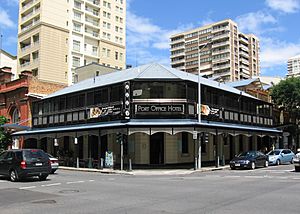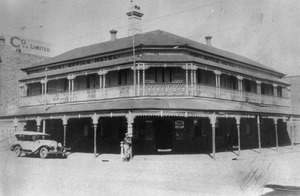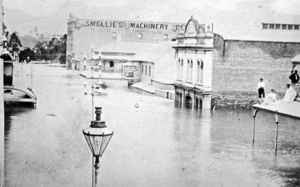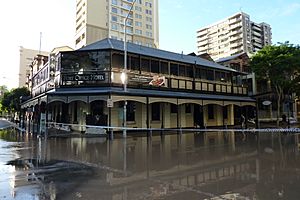Port Office Hotel facts for kids
Quick facts for kids Port Office Hotel |
|
|---|---|

Port Office Hotel, 2010
|
|
| Location | 40 Edward Street, Brisbane City, City of Brisbane, Queensland, Australia |
| Design period | 1870s–1890s (late 19th century) |
| Built | 1876 |
| Architect | James Cowlishaw |
| Official name: Port Office Hotel, Shamrock Hotel | |
| Type | state heritage (built) |
| Designated | 21 October 1992 |
| Reference no. | 600098 |
| Significant period | 1876 (fabric) 1909 (historical) |
| Significant components | furniture/fittings, store/s / storeroom / storehouse |
| Builders | Charles Midson |
| Lua error in Module:Location_map at line 420: attempt to index field 'wikibase' (a nil value). | |
The Port Office Hotel is a historic building in Brisbane City, Queensland, Australia. It is located on Edward Street. This old hotel was designed by James Cowlishaw. It was built in 1876 by Charles Midson.
The hotel was once known as the Shamrock Hotel. It is now listed on the Queensland Heritage Register. This means it is an important historical place.
Contents
A Look Back: The Hotel's Story
The very first hotel on this spot opened in May 1864. It was called the Shamrock Hotel.
In late 1876, the Shamrock Hotel was rebuilt. It became a two-storey building made of stone. It had nice verandahs (covered porches). James Cowlishaw designed the new building. Charles Midson was the builder.
What the Hotel Was Like in the Past
In 1888, the hotel was described as very large and comfortable. It had public and private bars. There was also a nice clubroom.
The hotel had fifteen bedrooms for guests. It also had a drawing room and two bathrooms. On the ground floor, there were four public rooms. Many people who worked near the river used to visit this hotel.
Facing the Floods
The building was affected by the big 1893 Brisbane flood. The water rose very high.
Around 1909, the hotel got a new owner, John Chillan Cutbush. He decided to change its name. That's when it became the Port Office Hotel.
In 1955, the hotel was updated. An architect named Francis Leo Cullen led this work. During this time, the verandahs were removed. Also, the decorative lacework and chimneys were taken away. The inside was also changed.
The hotel was flooded again in the 1974 Brisbane flood.
In the 1980s, more changes were made inside the hotel.
Because it is in a low area, the Port Office Hotel needed protection. During the 2011 Brisbane floods, sandbags were used to keep the water out.
What the Hotel Looks Like
The Port Office Hotel is on the corner of Edward and Margaret Streets. It is a two-storey building. It is made of brick, covered with a smooth finish. The roof is made of corrugated iron.
The smooth brickwork is designed to look like stone. The building has sections separated by corner stones called quoins. Many windows have stone sills (bottom parts). A large covered area sticks out over the street. This is called a awning.
There is also a separate storage building. It has a hipped roof (sloping on all sides). This building fills in the "L" shape of the hotel, making it a rectangle. A verandah has been added to the back wall on the eastern side. Some of the windows on the ground floor still have beautiful Leadlight windows.
Inside, some of the old wooden doors are still there. Also, some original door frames and baseboards remain. However, most of the inside, including the stairs, has been changed. This happened during different updates since the 1950s.
Why It's a Heritage Site
The Port Office Hotel was added to the Queensland Heritage Register on 21 October 1992. This means it is important for a few reasons.
Showing Queensland's History
The Port Office Hotel helps us understand Queensland's history. It shows how buildings and areas have changed over time. It is an important part of the lower Edward Street area. It stands with other historic buildings like the Port Office, Naval Offices, Old Mineral House, and Smellie's Building.
Its Beautiful Design
The hotel is also important because of its look. It adds to the beauty of the lower Edward Street area. Its design fits well with the nearby historic buildings. These include the Port Office, Naval Offices, Old Mineral House, and Smellie's Building.
 | James B. Knighten |
 | Azellia White |
 | Willa Brown |




